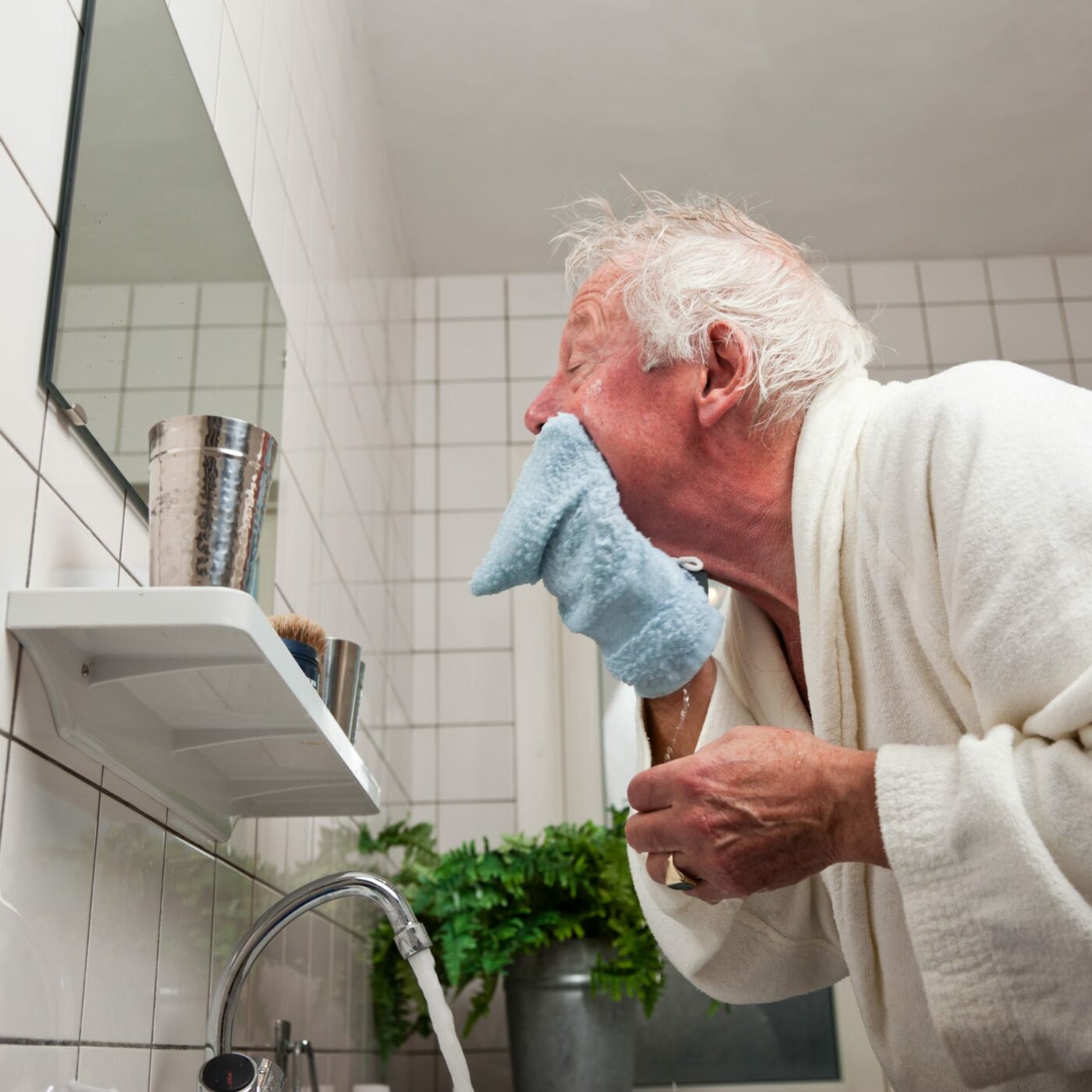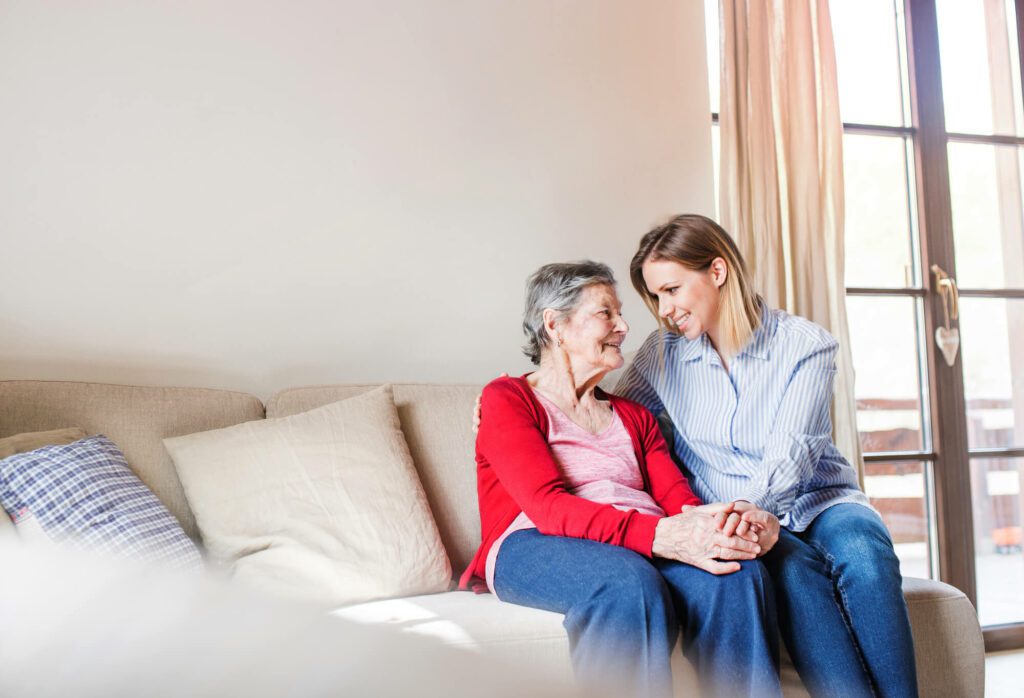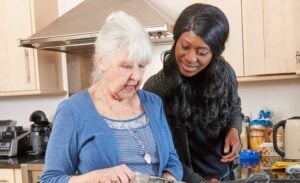Care for the elderly – grooming and hygiene guide
Tags
Live-in care
As a person ages, declining mobility and other conditions, such as dementia, may affect the ability to maintain personal hygiene. There are a number of ways you can help sustain proper hygiene and maintain a good quality of life.
With care through Elder, a care appraisal plan detailing your loved one’s needs will have been made. If you’re providing care yourself, it’s possible to create a plan with your loved one to assist both of you in meeting their personal hygiene care needs.
Where safe and able, giving the person being cared for tasks to participate in for their personal hygiene can be empowering, comforting, and maintain higher levels of independence. It is important to think from a perspective of ‘ability’ versus ‘inability’ and build a strengths-based plan.
Everyday Hygiene
Daily hygiene practices should include encouraging the person to wash their hands after the toilet – sometimes older people, especially those with dementia, need prompting to wash their hands after using the bathroom due to memory loss. If this is difficult, simply giving them a soapy facecloth may be enough to encourage them to ensure their hands are clean.
A daily routine should also ensure that the person’s face and genital area are washed, with a bath or shower twice a week as a minimum. To maintain oral hygiene, teeth should be cleaned in the morning and evening.
Helping with washing and bathing
It can be difficult for an older person to accept help with what will always have been a very private activity. Maintaining dignity is important, therefore, you should consider setting up bathing equipment and having materials to hand, checking water temperature, communicate clearly, and keep the person covered until it is time to get into the bath or shower. You can also cover parts of the body with a large washcloth during a bath or a strip wash.
You may find that it helps to make bathing a relaxing activity. Additional tips are to use their usual bath products and have their favourite music playing. It’s important to respect their preference for a bath or a shower where it’s safe to do so.
In care and dementia care in particular, explaining what is happening as you help with washing or bathing is essential. Sometimes this can seem like an invasion of the person’s privacy, so you need to be sensitive to their feelings and act accordingly.
Another helpful tip may be showering/bathing or a strip wash more frequently throughout the week but for shorter duration – i.e. washing different parts of the body on each occasion.
When caring for someone with poor hygiene, you may want to consider suggesting engaging in activities that require showering afterwards, such as swimming, as it may encourage them to do so if they see others showering.
Grooming and dressing
Personal appearance is important to most of us, and this doesn’t disappear when we age.
To help the person you’re caring for maintain their usual well-groomed personal appearance, ensure hair care is prioritised, washing hair, brushing and keeping it cut or trimmed when necessary, and shaving facial hair. Keeping the nails at a suitable length is also important for personal hygiene reasons and safety.
When dressing, allow them to wear the clothes they wish, if reasonable for the climate and environment – as clothing style is a central part of identity for many people.
When they’re groomed, clean and well-dressed, compliment them and use positive encouragement so they feel more inclined to maintain these routines.
You may also want to consider favourite makeup and accessories as a way to maintain the person’s sense of self.
Toileting
If a person becomesincontinent, it’s important to maintain their personal hygiene to reduce risks of infection and promote skin integrity. If the person you’re caring for has problems controlling their bladder or bowel functions, they’re at higher risk of developing infections or skin problems. As such, it’s vital to ensure that they have the correct continence aids and that these are changed regularly.
It does not take long for unpleasant skin conditions or skin infections to develop if an older person is left in a wet pad or underclothes. Sometimes limited mobility can contribute to an elderly person having “accidents”, and they may be embarrassed about this. Their GP can put you in touch with a continence advisor who can advise you about dealing with these issues.

Continence services
Troubles with urine flow affect around 1 in 3 people. If bladder control is not a problem, some people can still have mobility difficulties that make accessing the toilet difficult.
Skin issues, infections, body odour, and other health issues can be caused by continence problems, as well as affecting mental health, as it can embarrass people and cause them to lose confidence and become isolated.
GPs can provide assistance and knowledge, potentially direct you to experts in incontinence, occupational therapy, physical therapy, and nutrition.
You may be referred to a continence adviser, who can provide you with items and equipment that help with continence, such as, waterproof pants, disposable or washable pads, PVC or plastic bed covers.
Your local social services can provide you with home adaptations to assist with making toileting easier, such as handrails, commodes, raised toilets.
Continence is available to purchase personally, The Bladder & Bowel Community lists all the best products for continence needs.
Help with laundry
Social services often have laundry services for people with bowel/bladder problems or incontinence or simply for people who cannot adequately manage their household laundry. You can ask your local services if they provide laundry service. If they do, they may first carry out a needs assessment to understand your needs and what assistance you may need.
Ask your social services department if they provide this service. Your local council will usually conduct a needs assessment to determine what social care you need, including if laundry service is necessary. Your council may charge for the laundry service or only take large items like bedding.
Maintaining dignity
When helping someone wash, consider their emotional state. For example, deep bath water may cause anxiety for some people. Specialised bathroom equipment such as shower chairs can be used so the person can feel safer and stable, and may make it easier for the person to wash themselves if possible. Where necessary a referral for occupational therapy can be provided by your GP to assess for appropriate equipment.
When a bath is not an option, or there is a preference for showering a handheld shower can be used as an alternative to overhead showers, as they can cause fear and anxiety.
Allow the person you’re caring for some independence and ask them how they’d like to be helped, rather than assuming they’re comfortable with it. However, still prioritise their safety. You can also ask them about the hygiene routine they used to have and their preferred products, such as which shower gel they like so that they can keep as much familiarity as possible.
When providing consistent care, it’s recommended to inquire about the individual’s previous routine and use their preferred hygiene products for a more familiar experience.
The person will likely feel self-conscious undressing in front of you, so it’s important to be considerate of their dignity and handle the situation in an appropriate way for the individual.
For people who cannot be left alone in the bathroom or don’t want to be, bring towels and clothes ready prepared to the bathroom with you, so you don’t have to leave them alone at any point while in the bathroom.
Safety
People with limited mobility or problems with balance can be at higher risk in the bathroom. Assessing risks is an important part of assisting with hygiene support. Some tips for safety include: ensuring the floor is not wet and slippery and that the bathroom is warm. The water temperature should also be comfortable but not too hot, as some older people have reduced sensation. Non-slip mats can be used in the bathroom and tub/shower. If the person you care for can be left alone in the bathroom, make sure that you can easily gain access in the event of an emergency.
If the person you care for needs help getting in and out of the bath or shower, ensure that you know the principles of safe moving and handling and that any necessary aids are available. Assessments can be done by an occupational therapist, you should speak to your GP if you have any concerns.
Safely giving a bed bath
In cases where an individual has limited mobility, a bed bath may be necessary. It’s important to exercise caution when assisting them to move. You can purchase disposable baths designed for complete submersion that are accessible to individuals with this requirement.
This article is for informational purposes only and not to be taken as medical advice. For medical advice, always consult your GP.
Learn more about live-in care
Take a look at more Elder guides on the benefits of live-in care.



